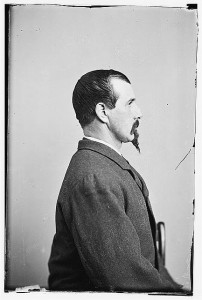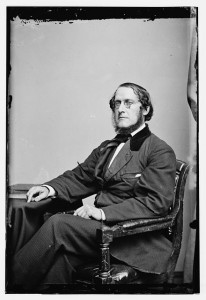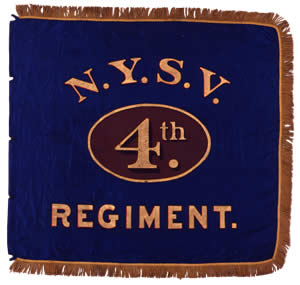Guns Along the Mohawk?
150 years ago this week lots of two year volunteers were returning North after their term of service had expired. In this article veterans in New York City are wasting no time planning a trip to Utica for a mass meeting of the loyal. They were hoping to be allowed to carry their arms on the trek.
From The New-York Times May 24, 1863:
LOYAL UNION LEAGUE MASS MEETING AT UTICA.; The Officers and Volunteers of Eight NewYork Regiments to Leave on Tuesday for the Meeting.PATRIOTIC ADDRESSES OF COL. BENDIX, HON. MR.WHITE, COL. HAWKINS AND COL. M’GREGOR. The New-York Loyal League and the Utica Convention. …
Pursuant to arrangement which was unanimously agreed upon, a large and enthusiastic assemblage of officers, volunteers and civilians, was held last night at the State Arsenal, corner of Thirty-fifth-street and Seventh-avenue. The object of the meeting was to explain in detail the arrangements which had been made by the Committee of the Loyal Union League, which had given the brave officers and soldiers an invitation to accompany them to Utica, and to be present at the great demonstration, to be held there on the 27th inst. …
Mr. WHITE made a very appropriate and businesslike address, during which he took occasion to give a full and satisfactory explanation of all the arrangements which had been entered into, to give ample and sufficient accommodation to the volunteers on leaving this city and on their arrival in Utica. He stated also that a telegraph had been sent to Albany to the Adjutant General asking permission for the volunteers to carry their arms on that day, but whether or not, they would go without their arms.
Col. HAWKINS came forward and was received with cheers. He said they had not long returned from the field from fighting rebels, and now, as they were at home once more, it would be no harm to fight the Copperheads. [Applause.] This great meeting was got up by loyal men, who are strongly in favor of the Union and Constitution, and would do all in their power to put down this wicked rebellion. [Loud cheers.]
SPEECH OF COL. M’GREGOR.
Col. MCGREGOR then presented himself, and was received with much applause. When it had subsided he spoke as follows: I am glad that we have met again here this evening according to arrangement; and as we have determined to go to Utica, we will be under the command of Col. HAWKINS, who is well qualified for that important duty. (Loud cheers.) It is quite evident now to all parties that there has been evinced by the military a warm and patriotic disposition to support the great movement at Utica, and in giving us an invitation to go there the Loyal League Committee is paying us a compliment. The military are not proceeding there to hold a mass meeting of their own, or to hold a political meeting, or anything of that kind. It was a meeting to support the Government; and in every movement which had this object in view, the loyal volunteers, when called upon, were ready to give their hearty cooperation. [Applause.] It was right, then, for them to go to Utica, and to Utica they would go. [Cries of “Go on, brave MCGREGOR.”] This they had now determined upon; and if there were any volunteer or man in this room who said to the contrary, let him do so now, [Loud cheers, and “No, no.”] The officers and volunteers who went there would be furnished with all the necessary supplies by the Committee of the Loyal League, and would be at no expense whatever. [Applause, and “That’s good.”] By these supplies he did not mean three or four days’ rations, for they would find the excursion a different thing from marching to the battle-field. [Cheers and laughter.] Since the proceedings of our last meeting appeared, and which appeared correctly in the NEW-YORK TIMES, I have also read in another paper, known as the New-York Express, a very different version, and a construction has been put on the few words which I then spoke which is anything but true. (A voice — “What about that lying journal?”) This same Express is worse than any rebel paper printed in Richmond, with the difference that it bears no comparison in the ability with which the Richmond Whig is conducted. It is very likely that this same Express has put me down as one of the “hogs;” but I do not know which of the BROOKS’ wrote the precious piece of composition I refer to — whether it was JAMES BROOKS or Booby BROOKS — [laughter, hisses and groans] — but the piece is so well written, and the composition so exceedingly elegant, that I cannot refrain from reading it to you. [Col. MCGREGOR then read the entire piece from the Express, commenting as he went along, which elicited roars of laughter, interspersed with repeated hisses and groans.] I am sure, continued he, that the men who are ready to put down this wicked rebellion, and who have already fought gallantly in the field of battle, are not the men to be influenced by Mr. WHITE, Col. BENDIX, or others, against their convictions, but they will go to Utica to show their patriotism, and their love and attachment to the Union. [Loud applause.] Nor will they be influenced either by JAMES or Booby BROOKS, the owners of this rebel journal, called the Express. [Reiterated cheers.] It is a pity to witness so rebellious a paper in the City of New-York. If our brave volunteers cannot go to Utica without the consent of the Express, then there is an end to a free press, freedom of action and free speech. I shall go myself, and if these Brookses have any doubt of the number of volunteers who shall go from New-York, we will pay their office a visit and let them review us in person. [Great applause.] …
Having earlier in the month fought at the Battle of Chancellorsville, Captain John D. McGregor of the 4th New York Infantry Regiment wasn’t in any mood to put up with what he considered the disloyal comments of James Brooks and his New York Daily Express. As an example, it had recently been reported that Mr. Brooks stated, “In my judgment and belief it is not so much the intention of the Administration to subjugate the South as it is to subjugate the North!”
Rush Hawkins was mustered out on May 20, 1863.



